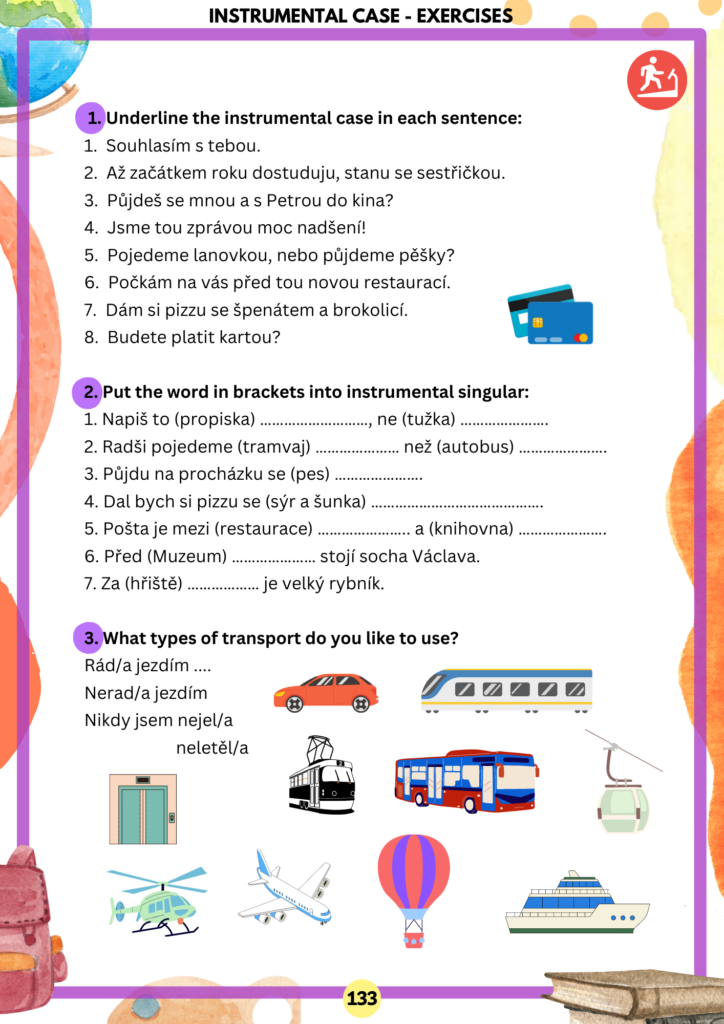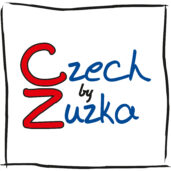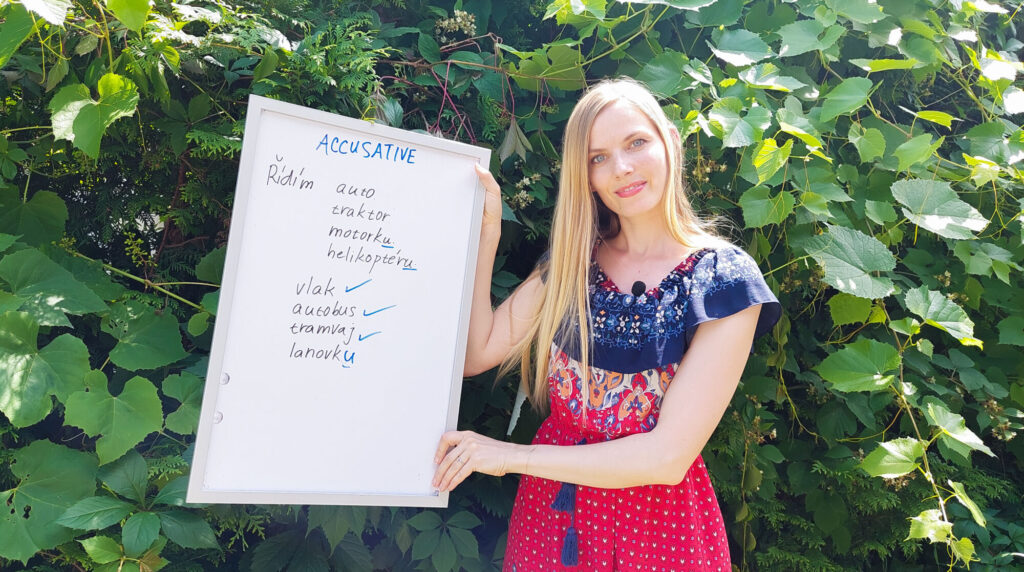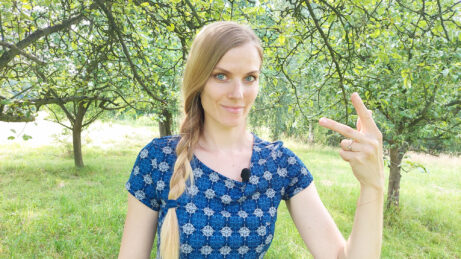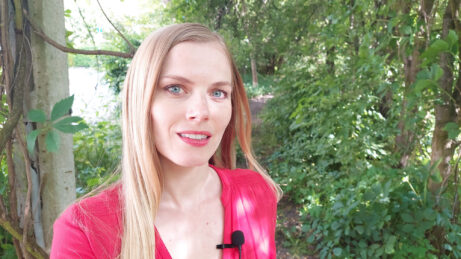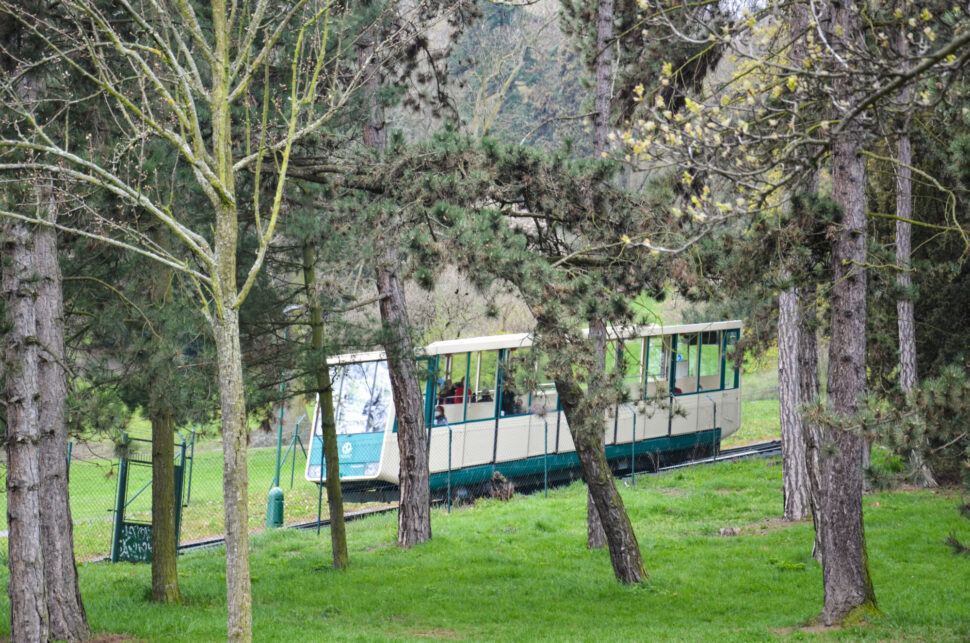
Let’s talk about means of transport
When it comes to using the means of transport in a phrase, we have to consider picking the right verb and of course, the right form of the noun (the particular means of transport). By the right form I mean the right case. What does that mean? Read below.
Would you prefer to watch this lecture in a video? Click here.
Let’s see these three phrases:
- Jedu autem. I’m going by car.
- Jedu na motorce. I’m riding a motorcycle.
- Řídím auto. I’m driving a car.
The words are marked in different colors for a reason:
- Autem is the instrumental case
- No motorce is the locative case
- Auto is the accusative case.
How can we know which case to use? And how to form it? Let’s take a look at these three cases one by one.
INSTRUMENTAL CASE
The instrumental case is often used when we want to translate a noun phrase that contains the preposition by. By car = autem, by bus = autobusem. Let’s see more context:
- Jedu autem. I’m going by car.
- Jedu vlakem. I’m going by train.
- Jedu tramvají. I’m going by tram.
- Jedu lanovkou. I’m going by cable car.
How to form it?
To all the masculine nouns ending with a consonant we will add -em:
vlak + em = vlakem
traktor + em = traktorem
When it comes to neuter nouns ending with -o, we take away o and add -em as well:
aut(o) + em = autem
metr(o) + em = metrem
Feminine nouns ending with -a will get rid of -a and take –ou instead:
lanovk(a) + ou = lanovkou
helikoptér(a) + ou = helikoptérou
Some feminine nouns also end in a consonant. In that case, we add -í at the end:
tramvaj + í = tramvají
Try it with these words:
- výtah (elevator): Jedu … ?
- autobus (bus):
- loď (boat):
- metro (subway):
- letadlo (plane):
- helikoptéra (helicopter):
Solutions: Jedu výtahem, autobusem, lodí (loď is feminine), metrem.
Letím letadlem, helikoptérou.
When we want to express we like to use a certain means of transport, we would use the verb jezdit (used for repetitive action).
- Rád(a) jezdím vlakem. – I like to go by train.
- Nikdy nejezdím výtahem. – I never go by elevator.
It’s also handy to know the verb dojíždět (to commute).
- Do práce dojíždím vlakem. – I commute by train to work.
- Dojíždíš tramvají, nebo chodíš pěšky? – Do you commute by bike or do you walk?
pěšky (on foot) is an adverb, it never changes its form
LOCATIVE CASE
The locative case always has a preposition in front of it, so that makes it easy to recognize! Some of the common prepositions related to this case are: o, na, v. When we want to translate a phrase with ride + noun, we would usually use the locative case.
- Jedu na motorce. I’m riding a motorbike.
- Jedu na kole. I’m riding a bike.
- Jedu na koni. I’m riding a horse.
- Jedu na skútru. I’m riding a scooter.
How to form it:
The locative case is quite complex when it comes to forms. I’m showing just a few examples related to transport, but if you would like to learn more about it, see my YouTube video on the Locative case. You can also check out my new e-book Just in Case… which will teach you all you need to know about Czech grammatical cases.
Feminine nouns ending in -ka:
motorka = motorce
Neuter nouns ending in -o:
kolo = kole
But careful, neuter nouns ending in -ro act differently:
metro = metru (e.g. Sedím v metru. – I’m sitting on the subway).
Masculine nouns often take -u at the end:
skútr = skútru
vlak = vlaku (e.g. Už sedím ve vlaku.)
And what about riding animals?
kůň (horse) = koni (quite irregular, as you can see)
osel (donkey) = oslu (formal); oslovi (informal)
By the way, if you say Jedu kolem, it has nothing to do with a bike. It means I’m passing by.
kolem = around, by
Let’s practice the locative case in these phrases:
- koloběžka (scooter – originally a toy for children – without engine): Jedu na …?
- slon (elephant):
- velbloud (camel):
Solutions: Jedu na koloběžce, slonovi (or slonu – formal), velbloudovi (or velbloudu – formal)
ACCUSATIVE CASE
The accusative case works as an object of the sentence. For instance, you could use the word motorka as the object of the sentence (accusative case) in these phrases:
- Řídím motorku. – I’m driving a motorbike.
- Koupil(a) jsem si motorku. – I bought a motorcycle.
- (Dávej) pozor na motorku! – Watch out for the motorbike!
- Nemám tu motorku rád. – I don’t like that motorbike.
Let’s see some examples with řídit (to drive):
- Řídím auto.
- Řídím traktor.
- Řídím helikoptéru.
The only word that changed was the feminine noun helikoptéra (just like motorka).
How to form it
The accusative case is quite simple when it comes to forming it. Only the feminine and masculine animate gender change their forms.
- motorka = motorku
- helikoptéra = helikoptéru
- loď = loď (feminine noun ending in a consonant!)
In this topic it doesn’t make much sense to talk about „driving“ a horse, camel or an elephant. But in case you wonder how it is…
kůň = koně Mám rád tohohle koně. – I like this horse.
velbloud = velblouda Půjčíme si velblouda. – We will rent a camel.
slon = slona Podívej se na toho slona! – Look at that elephant!
Are you curious about more? I would like to show you a page from my e-book Just in Case. Here you can see plenty of more examples for transport and do an exercise in the end. Keep in mind the color coding: purple – instrumental case, green – locative case, blue – accusative case
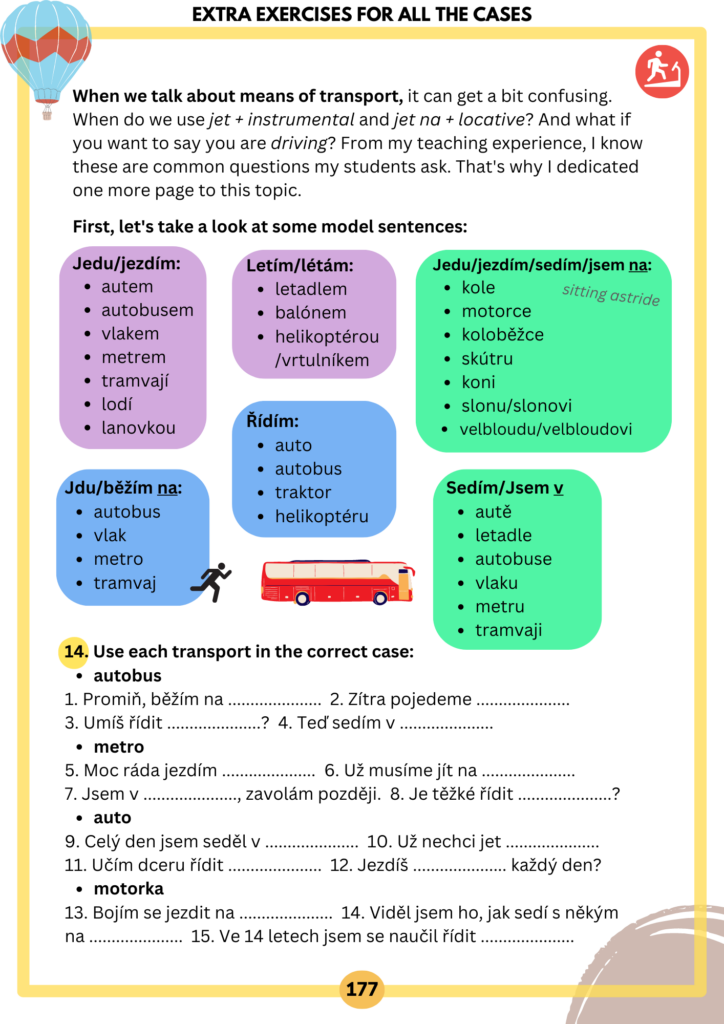
And here are the answers: 1. autobus, 2. autobusem, 3. autobus, 4. autobuse, 5. metrem, 6. metro 7. metru, 8. metro, 9. autě, 10. autem, 11. auto, 12. autem, 13. motorce, 14. motorce, 15. motorku
How did you do?
Just in case you want to learn more about grammatical cases, check out my e-book Just in Case….
In Just in Case…, you can find lots of useful information and exercises such as these:
